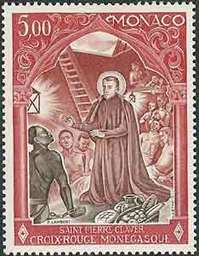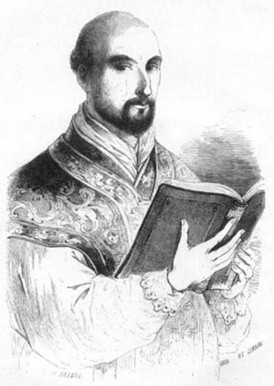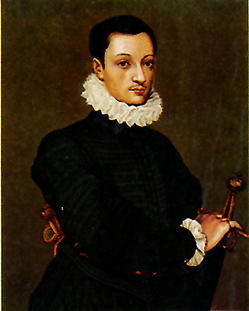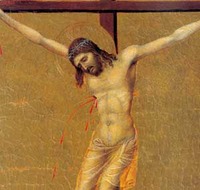Category: Jesuit saints & blesseds
Saint Ignatius of Loyola
Whoever does not bear his own cross and come after me, cannot be my disciple.
With the Church we pray:
O God, Who for spreading the greater glory of Thy Name did, through blessed Ignatius, strengthen Thy Church militant with a new army; grant that by his aid and example we may so fight on earth as to deserve to be crowned with him in heaven.
The Litany of Saint Ignatius of Loyola
Saint Ignatius’ life in pictures
Saint Aloysius Gonzaga
O blessed Aloysius, adorned with angelic graces, I, your most unworthy suppliant, recommend specially to you the chastity of my soul and body, praying you by your angelic purity to plead for me with Jesus Christ, the Immaculate Lamb, and his most holy Mother, Virgin of virgins, that they would keep me from all grievous sin.
O never let me be defiled with any stain of impurity; but when you see me in temptation, or in danger of falling, then remove far from my heart all bad thoughts and unclean desires, and awaken in me the memory of eternity to come and of Jesus crucified; impress deeply in my heart a sense of the holy fear of God; and thus, kindling in me the fire of divine love, enable me so to follow your footsteps here on earth that, in heaven with you, I may be made worthy to enjoy the vision of our God forever. Amen.
A brief biography on Saint Aloysius Gonzaga
Saint Peter Canisius
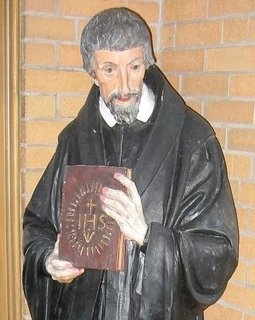 O God, Who did strengthen blessed Peter Thy Confessor, in virtue and learning for the defense of the Catholic faith: mercifully grant that through his examples and teaching, those who are in error may be brought back to salvation and that the faithful may persevere in the confession of the truth.
O God, Who did strengthen blessed Peter Thy Confessor, in virtue and learning for the defense of the Catholic faith: mercifully grant that through his examples and teaching, those who are in error may be brought back to salvation and that the faithful may persevere in the confession of the truth.
Jesuit Father John Hardon’s brief note on Saint Peter Canisius
On the third centenary of the death of the Saint Peter Canisius, Pope Leo XIII wrote to the Bishops of Austria, Germany and Switzerland:
7. This is not the place to recall in detail the life of this man, so eminent in sanctity; the zeal with which he labored to restore harmony and union to his country torn by dissension and revolt; the ardor of his public debates with the teachers of error; his inspiring sermons; the persecutions he suffered; the many countries he travelled through; and the difficult missions he undertook in the interest of the faith. However, to return to the weapons of knowledge which we have mentioned: how constantly, readily, wisely and fitly he employed them! Upon his return from Messana where he went as a teacher of rhetoric, he committed himself to the teaching of the sacred sciences in the academies of Cologne, Ingolstadt and Vienna. Here he followed the royal road of the most approved learned men of the Christian school and revealed to the Germans the treasures of scholastic philosophy. As this philosophy was shunned at that time by the enemies of the faith because it was a great support of Catholic truth, he had it taught publicly in the schools and colleges of the Society of Jesus for whose establishment he had worked so hard.
8. He did not hesitate to descend from the heights of wisdom to the basics of writing. He undertook the instruction of children and even composed elementary writing books and grammars for their use. Indeed, just as he often came back from preaching to the courts of kings to address the people, so, after learned writings on dogma or morals, he used to compose pamphlets destined either to strengthen the faith of the people or to
 arouse and nourish their piety. He had wonderful success in preventing the inexperienced from getting caught in the nets of error. The Summa which he published for this purpose is a compact and tightly-knit work, written in beautiful Latin and not unworthy of the Fathers of the Church. This remarkable work was enthusiastically received by learned men in almost all the countries of Europe. Less voluminous, but no less useful, were the two famous catechisms which this blessed man wrote for less cultivated minds: one for the religious instruction of children, the other for young men already involved in the study of the arts. These two works had such a great success among Catholics immediately upon publication, that almost all professors charged with teaching the basics of the faith had them in hand. They were used not only in the schools as a spiritual milk for the children, but they were also explained publicly in the churches to the benefit of all. Thus, during three centuries Canisius has been regarded as the teacher of Catholics in Germany. In popular speech, “knowing Canisius” was synonymous with “preserving the Christian faith.“
arouse and nourish their piety. He had wonderful success in preventing the inexperienced from getting caught in the nets of error. The Summa which he published for this purpose is a compact and tightly-knit work, written in beautiful Latin and not unworthy of the Fathers of the Church. This remarkable work was enthusiastically received by learned men in almost all the countries of Europe. Less voluminous, but no less useful, were the two famous catechisms which this blessed man wrote for less cultivated minds: one for the religious instruction of children, the other for young men already involved in the study of the arts. These two works had such a great success among Catholics immediately upon publication, that almost all professors charged with teaching the basics of the faith had them in hand. They were used not only in the schools as a spiritual milk for the children, but they were also explained publicly in the churches to the benefit of all. Thus, during three centuries Canisius has been regarded as the teacher of Catholics in Germany. In popular speech, “knowing Canisius” was synonymous with “preserving the Christian faith.“
Pope Leo XIII, Militantis Ecclesiae (On St. Peter Canisius), August 1, 1897.
Saint Francis Xavier
 O God, who was pleased to gather unto your Church the people of the East by the preaching and miracles of blessed Francis, mercifully grant that we who honor his glorious merits, may also imitate the example of his virtues, through Jesus Christ our Lord.
O God, who was pleased to gather unto your Church the people of the East by the preaching and miracles of blessed Francis, mercifully grant that we who honor his glorious merits, may also imitate the example of his virtues, through Jesus Christ our Lord.
Jesuit Father John Hardon’s essay “The Miracles of Saint Francis Xavier.”
Saint Edmund Campion & his Brag
The blood of the holy martyrs was poured out upon the earth for Christ; therefore
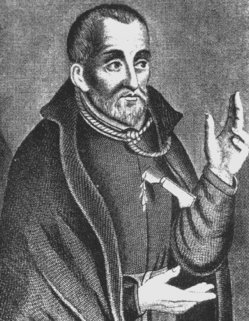 they have won rewards everlasting.
they have won rewards everlasting.
Saint Edmund Campion, martyr for the Roman Primacy, obtain for us, but especially for the Church’s bishops and priests, such obedient loyalty to the Vicar of Christ that like you, they will not be afraid to proclaim the truth and like you, they will be willing to shed their blood for Jesus Christ.
Some info on Campion can be read here and here.
Saint Edmund Campion (1540-1581) wrote the “Challenge to the Privy Council” but is commonly called today “Campion’s brag.” Some scholars say the Challenge is likely to be the earliest defense of the Catholic faith to appear in English at the time of the Reformation. No doubt Saint Edmund Campion takes 1 Peter seriously: give a reasoned defense for what you’re believing. The duty and responsibility of Campion to act as a priest and a vowed Jesuit concerned for the spiritual welfare of the English is clear; reading the Brag you quickly know that he is not ashamed of the Gospel and desires to bring his listeners to the Truth. His style of speaking and acting is direct but courteous offered in friendship.
My favorite line is the last of section 8: “The expense is reckoned, the enterprise is begun; it is of God; it cannot be withstood. So the faith was planted: So it must be restored.”
To the Right Honourable, the Lords of Her Majesty’s Privy Council:
Whereas I have come out of Germany and Bohemia, being sent by my superiors, and adventured myself into this noble realm, my dear country, for the glory of God and benefit of souls, I thought it like enough that, in this busy, watchful, and suspicious world, I should either sooner or later be intercepted and stopped of my course.
Wherefore, providing for all events, and uncertain what may become of me, when God shall haply deliver my body into durance, I supposed it needful to put this in writing in a readiness, desiring your good lordships to give it your reading, for to know my cause. This doing, I trust I shall ease you of some labour. For that which otherwise you must have sought for by practice of wit, I do now lay into your hands by plain confession. And to the intent that the whole matter may be conceived in order, and so the better both understood and remembered, I make thereof these nine points or articles, directly, truly and resolutely opening my full enterprise and purpose.
1. I confess that I am (albeit unworthy) a priest of the Catholic Church, and through the
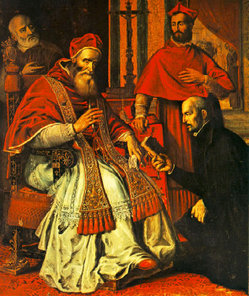 great mercy of God vowed now these eight years into the religion [religious order] of the Society of Jesus. Hereby I have taken upon me a special kind of warfare under the banner of obedience, and also resigned all my interest or possibility of wealth, honour, pleasure, and other worldly felicity.
great mercy of God vowed now these eight years into the religion [religious order] of the Society of Jesus. Hereby I have taken upon me a special kind of warfare under the banner of obedience, and also resigned all my interest or possibility of wealth, honour, pleasure, and other worldly felicity.
2. At the voice of our General, which is to me a warrant from heaven and oracle of Christ, I took my voyage from Prague to Rome (where our General Father is always resident) and from Rome to England, as I might and would have done joyously into any part of Christendom or Heatheness, had I been thereto assigned.
3. My charge is, of free cost to preach the Gospel, to minister the Sacraments, to instruct the simple, to reform sinners, to confute errors–in brief, to cry alarm spiritual against foul vice and proud ignorance, wherewith many of my dear countrymen are abused.
4. I never had mind, and am strictly forbidden by our Father that sent me, to deal in any respect with matter of state or policy of this realm, as things which appertain not to my vocation, and from which I gladly restrain and sequester my thoughts.
5. I do ask, to the glory of God, with all humility, and under your correction, three sorts of indifferent and quiet audiences: the first, before your Honours, wherein I will discourse of religion, so far as it toucheth the common weal and your nobilities: the second, whereof I make more account, before the Doctors and Masters and chosen men of both universities, wherein I undertake to avow the faith of our Catholic Church by proofs innumerable–Scriptures, councils, Fathers, history, natural and moral reasons: the third, before the lawyers, spiritual and temporal, wherein I will justify the said faith by the common wisdom of the laws standing yet in force and practice.
6. I would be loath to speak anything that might sound of any insolent brag or challenge, especially being now as a dead man to this world and willing to put my head under every man’s foot, and to kiss the ground they tread upon. Yet I have such courage in avouching the majesty of Jesus my King, and such affiance in his gracious favour, and such assurance in my quarrel, and my evidence so impregnable, and because I know perfectly that no one Protestant, nor all the Protestants living, nor any sect of our adversaries (howsoever they face men down in pulpits, and overrule us in their kingdom of grammarians and unlearned ears) can maintain their doctrine in disputation. I am to sue most humbly and instantly for combat with all and every of them, and the most principal that may be found: protesting that in this trial the better furnished they come, the better welcome they shall be.
7. And because it hath pleased God to enrich the Queen my Sovereign Lady with notable gifts of nature, learning, and princely education, I do verily trust that if her Highness would vouchsafe her royal person and good attention to such a conference as, in the second part of my fifth article I have motioned, or to a few sermons, which in her or your hearing I am to utter such manifest and fair light by good method and plain dealing may be cast upon these controversies, that possibly her zeal of truth and love of her people shall incline her noble Grace to disfavour some proceedings hurtful to the realm, and procure towards us oppressed more equity.
8. Moreover I doubt not but you, her Highness’ Council, being of such wisdom and discreet in cases most important, when you shall have heard these questions of religion opened faithfully, which many times by our adversaries are huddled up and confounded,
 will see upon what substantial grounds our Catholic Faith is builded, how feeble that side is which by sway of the time prevaileth against us, and so at last for your own souls, and for many thousand souls that depend upon your government, will discountenance error when it is bewrayed [revealed], and hearken to those who would spend the best blood in their bodies for your salvation. Many innocent hands are lifted up to heaven for you daily by those English students, whose posterity shall never die, which beyond seas, gathering virtue and sufficient knowledge for the purpose, are determined never to give you over, but either to win you heaven, or to die upon your pikes. And touching our Society, be it known to you that we have made a league–all the Jesuits in the world, whose succession and multitude must overreach all the practice of England–cheerfully to carry the cross you shall lay upon us, and never to despair your recovery, while we have a man left to enjoy your Tyburn, or to be racked with your torments, or consumed with your prisons. The expense is reckoned, the enterprise is begun; it is of God; it cannot be withstood. So the faith was planted: So it must be restored.
will see upon what substantial grounds our Catholic Faith is builded, how feeble that side is which by sway of the time prevaileth against us, and so at last for your own souls, and for many thousand souls that depend upon your government, will discountenance error when it is bewrayed [revealed], and hearken to those who would spend the best blood in their bodies for your salvation. Many innocent hands are lifted up to heaven for you daily by those English students, whose posterity shall never die, which beyond seas, gathering virtue and sufficient knowledge for the purpose, are determined never to give you over, but either to win you heaven, or to die upon your pikes. And touching our Society, be it known to you that we have made a league–all the Jesuits in the world, whose succession and multitude must overreach all the practice of England–cheerfully to carry the cross you shall lay upon us, and never to despair your recovery, while we have a man left to enjoy your Tyburn, or to be racked with your torments, or consumed with your prisons. The expense is reckoned, the enterprise is begun; it is of God; it cannot be withstood. So the faith was planted: So it must be restored.
9. If these my offers be refused, and my endeavours can take no place, and I, having run thousands of miles to do you good, shall be rewarded with rigour. I have no more to say but to recommend your case and mine to Almighty God, the Searcher of Hearts, who send us his grace, and see us at accord before the day of payment, to the end we may at last be friends in heaven, when all injuries shall be forgotten.
Blessed Miguel Pro
 Today is the liturgical memorial of Blessed Miguel Pro, a fitting connection with today’s Solemnity of Christ the King, and the devotion to the Sacred Heart. The memorable line of Pro’s is his last: Long live Christ the King. With that he was killed. Blessed Miguel Pro teaches us to serve Christ the King all that we do and remain close to the mercy of God. He wrote:
Today is the liturgical memorial of Blessed Miguel Pro, a fitting connection with today’s Solemnity of Christ the King, and the devotion to the Sacred Heart. The memorable line of Pro’s is his last: Long live Christ the King. With that he was killed. Blessed Miguel Pro teaches us to serve Christ the King all that we do and remain close to the mercy of God. He wrote:
I believe, O Lord, but strengthen my faith… Heart of Jesus, I love Thee; but increase my love. Heart of Jesus, I trust in Thee; but give greater vigor to my confidence. Heart of Jesus, I give my heart to Thee; but so enclose it in Thee that it may never be separated from Thee. Heart of Jesus, I am all Thine; but take care of my promise so that I may be able to put it in practice even unto the complete sacrifice of my life.
Chaplet of Blessed Miguel Pro, SJ
Blessed Miguel, before your death, you told your friend to ask you for favors when you were in Heaven. I beg you to intercede for me and in union with Our Lady and all the angels and saints, to ask Our Lord to grant my petition, provided that it be God’s Will. {mention the request}
We honor and adore the triune God. The Gloria.
We ask the Holy Spirit for guidance. Come Holy Ghost.
We pray as Jesus taught us to pray. The Our Father.
We venerate with love the Virgin Mary. The Hail Mary.
All you angels, bless you the Lord forever.
Saint Joseph, Saint {name of your patron}, and all the saints, pray for us.
Blessed Miguel, high spirited youth, pray for us. Viva Christo Rey.
Blessed Miguel, loving son and brother, pray for us. Viva Christo Rey.
Blessed Miguel, patient novice, pray for us. Viva Christo Rey.
Blessed Miguel, exile from your homeland, pray for us. Viva Christo Rey.
Blessed Miguel, prayerful religious, pray for us. Viva Christo Rey.
Blessed Miguel, sick and suffering, pray for us. Viva Christo Rey.
Blessed Miguel, defender of workers, pray for us. Viva Christo Rey.
Blessed Miguel, courageous priest in hiding, pray for us. Viva Christo Rey.
Blessed Miguel, prisoner in jail, pray for us. Viva Christo Rey.
Blessed Miguel, forgiver of persecutors, pray for us. Viva Christo Rey.
Blessed Miguel, holy martyr, pray for us. Viva Christo Rey.
Imprimatur: Joseph A. Fiorenza, Bishop of Galveston – Houston, August 13, 1995
North American Martyrs
In the North American context these martyrs demonstrate for me the work of grace in the
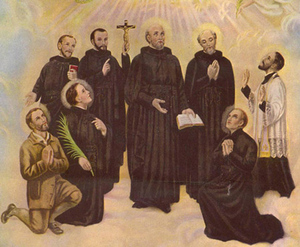 face of tremendous hardship which some would say evil. As a child when visiting my grandparents on their farm in Fonda, New York, my family would make the trip for Mass to the Shrine of the North American Martyrs in Auriesville, located in the beautiful Mohawk Valley. I learned early in my life that these martyrs, followed Jesus very closely, even to the point of identifying with Christ crucified and offering their total being to the point of death. The deaths of these men were particularly gruesome. The Gospel pericope for the feast and which focuses the mission is what Saint Matthew records: “Go therefore and make disciples of all nations, baptizing them in the name of the Father and of the Son and of the Holy Spirit, teaching them to observe all that I have commanded you; and lo, I am with you always, to the close of the age.”
face of tremendous hardship which some would say evil. As a child when visiting my grandparents on their farm in Fonda, New York, my family would make the trip for Mass to the Shrine of the North American Martyrs in Auriesville, located in the beautiful Mohawk Valley. I learned early in my life that these martyrs, followed Jesus very closely, even to the point of identifying with Christ crucified and offering their total being to the point of death. The deaths of these men were particularly gruesome. The Gospel pericope for the feast and which focuses the mission is what Saint Matthew records: “Go therefore and make disciples of all nations, baptizing them in the name of the Father and of the Son and of the Holy Spirit, teaching them to observe all that I have commanded you; and lo, I am with you always, to the close of the age.”
Brief biographies of the martyrs
Jesuit Father John Hardon’s reflection on the North American martyrs
Jesuit Father James Martin’s reflection on the martyrs
Jesuit Priests
St. Jean de Brebeuf
St. Nöel Chabanel
St. Anthony Daniel
St. Charles Garnier
St. Issac Joques
St. Gabriel Lalemant
Laymen
St. Rene Goupil
St. Jean de la Lande
Father, you consecrated the first beginnings of the faith in North America by preaching and martyrdom of Saints John & Isaac and their companions. By the help of their prayers may the Christian faith continue to grow throughout the world.
It is said that Father Jogues succeeded in burying Brother Rene Goupil calling him a martyr, because slain in hatred of God and the Church, and of their sign which is the Cross, and while exercising ardent charity towards his neighbor.
Love God as He ought to be loved, as Peter Claver lived
A former colleague of mine, the late Jesuit Father Joseph MacDonnell inspired this brief biography of today’s saint, Peter Claver, some time ago. Claver lived the dictum of his friend Saint Alphonsus Rodriguez, a lay brother who was discerning: “Look for God in all men and serve them as images of Him.”
Saint Peter Claver, Spanish born (1580-1654), as a university student met the Society of Jesus and entered the same in 1602; he
 studied philosophy on the island of Majorca at the college of Montesión whose doorkeeper, Jesuit Brother Alphonsus Rodríguez encouraged young Peter. In 1610 he was sent to South America where he finished his studies, ordained to the priesthood in 1616 and then worked for 35 years helping to alleviate the spiritual and physical sufferings of the victims of Cartagena’s despicable slave trade. He referred to himself as “the slave of the slaves forever.”
studied philosophy on the island of Majorca at the college of Montesión whose doorkeeper, Jesuit Brother Alphonsus Rodríguez encouraged young Peter. In 1610 he was sent to South America where he finished his studies, ordained to the priesthood in 1616 and then worked for 35 years helping to alleviate the spiritual and physical sufferings of the victims of Cartagena’s despicable slave trade. He referred to himself as “the slave of the slaves forever.”
His missionary vocation had been inspired by Brother Rodriguez (later canonized) who urged Peter: “Your mission is to the West Indies. Why don’t you go there and work for the Lord”? In Cartagena, Colombia he dedicated his energy to the poor people who had been shipped like cattle from Africa to Cartagena only to be sold to the highest bidder. It was said of him that he seemed to be everywhere at once because of the incredible speed with which he went about visiting the sick and instructing the ignorant, even in the scorching sun, drenching rain or biting wind which usually kept many of the inhabitants of Cartagena indoors. When the worn out slaves caught sight of him they clapped their hands by way of salute. Peter managed to convince the local authorities to issue a law that no new arrivals be baptized until they received adequate instruction. He then used this law to delay their departure into a life of slavery by prolonging his catechism classes, much to the chagrin of the slave dealers. Peter also irritated the wealthy citizens who came for the sacrament of Penance and found that they had to wait in line along with the slaves. He would say, “To love God as He ought to be loved, we must be detached from all temporal love. We must love nothing but Him, or if we love anything else, we must love it only for His sake.”
Peter Claver was esteemed as a saint in his own time and stories of his miracles were commonplace. When he died fervor seized the whole city to honor him as a saint. The Jesuit college was besieged by crowds who came to venerate his mortal remains. Slaves came from all parts of the city and neighboring towns. He was declared the Patron Saint of African missionaries.
Today, Saint Peter’s life inspires Catholics to serve the poor as Knights of Peter Claver and Ladies Auxillary.
Looking to Our Destiny with Saint Ignatius of Loyola as a guide
On the Memorial of Saint Ignatius of Loyola there are many things that can be said of the Pilgrim-Saint and the Jesuit Order. Today, let us pray using the words of Loyola’s The First Principle and Foundation:
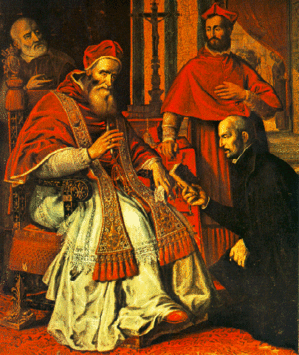 The goal of our life is to live with God forever. God who loves us, gave us life. Our own response of love allows God’s life to flow into us without limit. All the things in this world are gifts of God, presented to us so that we can know God more easily and make a return of love more readily. As a result, we appreciate and use all these gifts of God insofar as they help us develop as loving persons. But if any of these gifts become the center of our lives, they displace God and so hinder our growth toward our goal. In everyday life, then, we must hold ourselves in balance before all of these created gifts insofar as we have a choice and are not bound by some obligation.
The goal of our life is to live with God forever. God who loves us, gave us life. Our own response of love allows God’s life to flow into us without limit. All the things in this world are gifts of God, presented to us so that we can know God more easily and make a return of love more readily. As a result, we appreciate and use all these gifts of God insofar as they help us develop as loving persons. But if any of these gifts become the center of our lives, they displace God and so hinder our growth toward our goal. In everyday life, then, we must hold ourselves in balance before all of these created gifts insofar as we have a choice and are not bound by some obligation.
We should not fix our desires on health or sickness, wealth or poverty, success or failure, a long life or short one. For everything has the potential of calling forth in us a deeper response to our life in God. Our only desire and our one choice should be this: I want and I choose what better leads to the deepening of God’s life in me.
– St. Ignatius as paraphrased by David L. Fleming, S.J. from the beginning of the Spiritual Exercises
